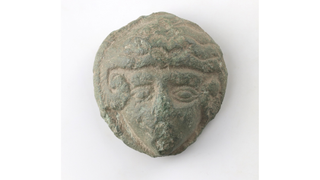ramonmercado
CyberPunk
- Joined
- Aug 19, 2003
- Messages
- 58,270
- Location
- Eblana
I couldn't find an Alexander thread apart from one about the Film, so I guess this deserves a thread of its own.
Rare Discovery: Engraved Gemstone Carrying A Portrait Of Alexander The Great
http://www.sciencedaily.com/releases/20 ... 101147.htm
This is an engraved gemstone carrying a portrait of Alexander the Great. The gemstone was found in the course of recent excavations at Tel Dor. (Credit: No'a Raban-Gerstel, University of Haifa)ScienceDaily (Sep. 22, 2009) — A rare and surprising archaeological discovery at Tel Dor: A gemstone engraved with the portrait of Alexander the Great was uncovered during excavations by an archaeological team directed by Dr. Ayelet Gilboa of the University of Haifa and Dr. Ilan Sharon of the Hebrew University of Jerusalem.
"Despite its miniature dimensions – the stone is less than a centimeter high and its width is less than half a centimeter – the engraver was able to depict the bust of Alexander on the gem without omitting any of the ruler's characteristics," notes Dr. Gilboa, Chair of the Department of Archaeology at the University of Haifa. "The emperor is portrayed as young and forceful, with a strong chin, straight nose and long curly hair held in place by a diadem."
The Tel Dor researchers have noted that it is surprising that a work of art such as this would be found in Israel, on the periphery of the Hellenistic world. "It is generally assumed that the master artists – such as the one who engraved the image of Alexander on this particular gemstone – were mainly employed by the leading Hellenistic courts in the capital cities, such as those in Alexandria in Egypt and Seleucia in Syria. This new discovery is evidence that local elites in secondary centers, such as Tel Dor, appreciated superior objects of art and could afford ownership of such items," the researchers stated.
The significance of the discovery at Tel Dor is in the gemstone being uncovered in an orderly excavation, in a proper context of the Hellenistic period. The origins of most Alexander portraits, scattered across numerous museums around the world, are unknown. Some belonged to collections that existed even prior to the advent of scientific archaeology, others were acquired on the black market, and it is likely that some are even forgeries.
This tiny gem was unearthed by a volunteer during excavation of a public structure from the Hellenistic period in the south of Tel Dor, excavated by a team from the University of Washington at Seattle headed by Prof. Sarah Stroup. Dr. Jessica Nitschke, professor of classical archaeology at Georgetown University in Washington DC, identified the engraved motif as a bust of Alexander the Great. This has been confirmed by Prof. Andrew Stewart of the University of California at Berkeley, an expert on images of Alexander and author of a book on this topic.
Alexander was probably the first Greek to commission artists to depict his image – as part of a personality cult that was transformed into a propaganda tool. Rulers and dictators have implemented this form of propaganda ever since. The artists cleverly combined realistic elements of the ruler's image along with the classical ideal of beauty as determined by Hellenistic art, royal attributes (the diadem in this case), and divine elements originating in Hellenistic and Eastern art. These attributes legitimized Alexander's kingship in the eyes of his subjects in all the domains he conquered. These portraits were distributed throughout the empire, were featured on statues and mosaics in public places and were engraved on small items such as coins and seals. The image of Alexander remained a popular motif in the generations that followed his death – both as an independent theme and as a subject of emulation. The conqueror's youthful image became a symbol of masculinity, heroism and divine kingship. Later Hellenist rulers adopted these characteristics and commissioned self-portraits in the image of Alexander.
Dor was a major port city on the Mediterranean shore from the Middle Bronze Age (2000-1550 B.C.E) until the establishment of Caesarea during the Roman period. Alexander the Great passed through Dor in 332 B.C.E., following the occupation of Tyre and on his way to Egypt. It seems that the city submitted to Alexander without resistance. Dor then remained a center of Hellenization in the land of Israel until it was conquered by Alexander Janneus, Hasmonean king of Judah (c. 100 B.C.E.).
The team of archaeologists has been excavating at Tel Dor for close to thirty years and recently completed the 2009 excavation season. A number of academic institutions in Israel and abroad participate in the excavations, directed by Dr. Ayelet Gilboa of the University of Haifa and Dr. Ilan Sharon of the Hebrew University of Jerusalem. The project is supported by these two institutions along with the Israel Exploration Society, the Berman foundation for Biblical Archaeology, the Zinman Institute of Archaeology, the Wendy Goldhirsh Foundation, USA, and individual donors. The gemstone will be on public display at the Dor museum in Kibbutz Nahsholim.


